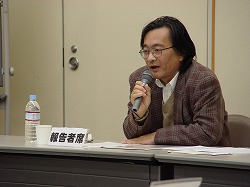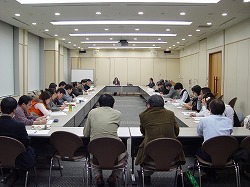9th East Asian Culture Research Meeting of 2008
Academic Frontier Sub-project 2:“Japan as Other Culture”
9th East Asian Culture Research Meeting of 2008
“A Capitalist Society called Socialism, and a Socialist Society called Capitalism:
Chinese Culture and Japanese Culture”
・Speaker: SHIROTA Tomoharu (Professor, University of Tokyo Graduate School of Cultural Studies)
・Date: Wednesday, 3 December 2008, 18:30-20:30
・Venue: Hosei University Ichigaya Campus, Boissonade Tower 26F Conference Room A
・Chair: WANG Min (Professor, Hosei University Institute of International Japan-Studies), ABIKO Shin (Director, Hosei University Institute of International Japan-Studies)


In general, Japan is referred to outwardly as a capitalist society, while China, as a socialist society; however, sociocultural observations since the pre-modern period reveal a different angle. Chinese society, which, from the pre-modern era, adopted a liberal bureaucratic selection system by equal share succession and examination, gave birth to a society with a strong competitive consciousness towards betterment, in which anyone could rise in the world. Also, in order to control such a vast region, people sought decentralized rule along with the development of regional economies, and even now the tendency is strongly towards local governance. In contrast, in Japan, family succession was standard practice since the pre-modern era, and as the status system had stability, a society was born which suppressed fierce competitiveness and achieved uniformity within each status. In the midst of modernization, although China was late in its formation of a nation state due to these decentralized elements, the global trend towards a new liberal system, evolving from the end of the 20th century, bonded with the people’s desire for betterment and facilitated rapid economic development. Japan’s sociocultural uniformity and harmony immediately contributed to the formation of a centralized nation state, and prewar national allegiance converted into postwar corporate loyalty, thus achieving high-level economic success. However, Japanese-style business did not lend itself to new liberalist tendencies; rather it was late to revolutionize. Also, in relation to the handling of the recent economic crisis, it proves significant to add to each respective sociocultural picture what we have called the Chinese “capitalist elements” and Japanese “socialist elements”.
Report by: SHIROTA Tomoharu (Professor, University of Tokyo Graduate School of Cultural Studies)


